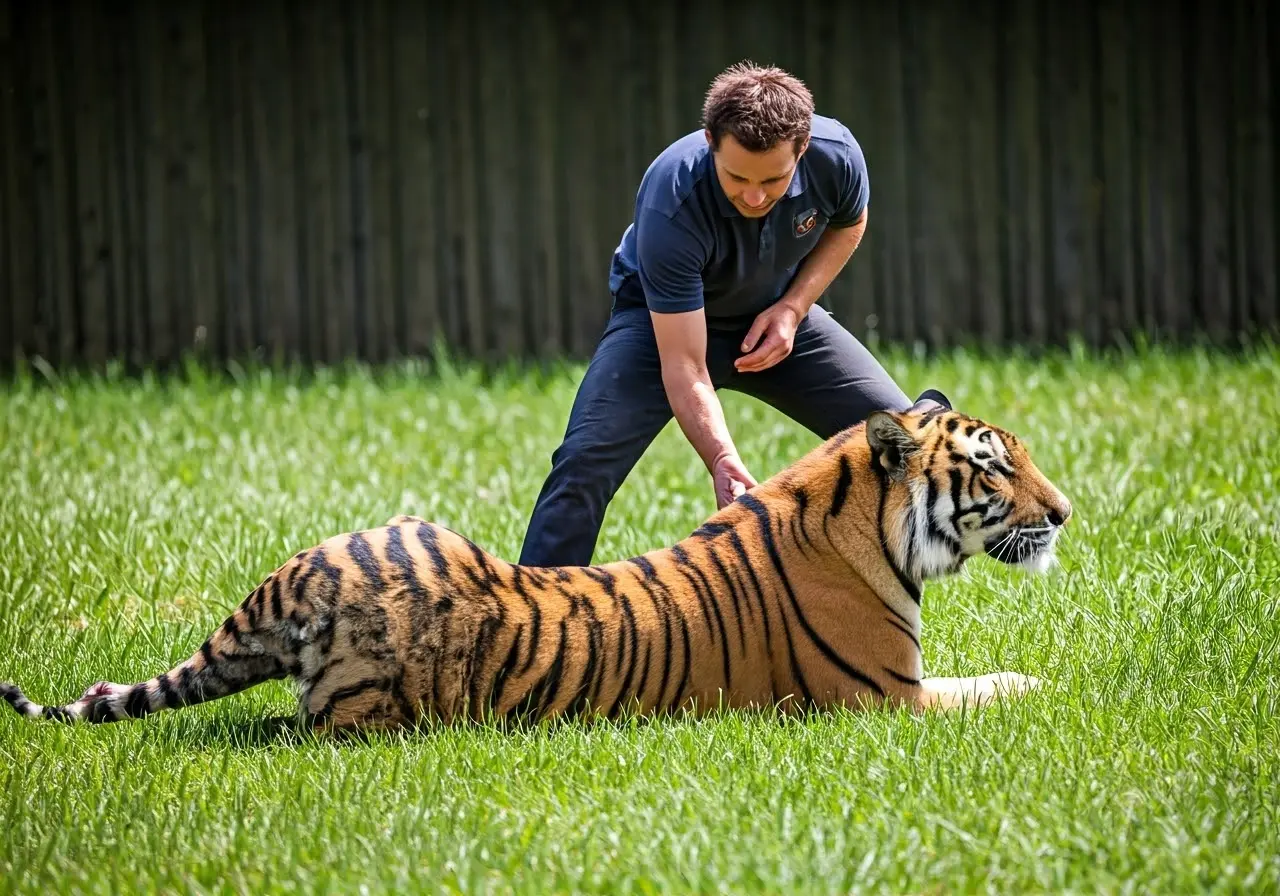Exotic animal shows captivate audiences with the beauty and allure of creatures from all over the world. But what goes on behind the scenes to make these shows possible? This blog takes a closer look at the rigorous training and meticulous care that these amazing animals receive.
The Appeal of Exotic Animal Shows
Exotic animal shows draw large crowds with their promise of seeing rare and beautiful creatures in action. From breathtaking acrobatics to fascinating behaviors, these shows offer an opportunity to witness the wonders of the animal kingdom up close.
The unique blend of entertainment and education keeps audiences captivated from beginning to end. People of all ages find themselves enthralled by the majestic presence of animals like lions, tigers, and elephants. These shows also provide a platform for lesser-known species to be showcased, opening minds to the diversity and splendor of the natural world.
Moreover, exotic animal shows often incorporate impressive narrative elements that make the experience unforgettable. Stories of survival, adventure, and the incredible capabilities of these animals are brought to life through engaging performances. As the curtain rises, spectators are transported to different ecosystems and habitats, gaining a deeper appreciation for the creatures that share our planet.
Animal Training Techniques
Training exotic animals requires patience, skill, and a deep understanding of each species. Positive reinforcement, consistency, and creating a bond of trust are key components in training animals to perform various tasks and tricks.
Positive reinforcement involves rewarding animals with treats, praise, or toys for performing desired behaviors. This method fosters a positive association with specific actions, encouraging animals to repeat them willingly. It is a humane alternative to traditional training methods, staving off the need for coercion or punishment.
Consistency is crucial in animal training. Trainers must provide clear and consistent cues to ensure that animals understand what is expected of them. Regular training sessions, coupled with consistent rewards, help embed the learning into the animal’s routine. Over time, this consistency builds a level of trust between trainer and animal that is indispensable for complex performances.
Developing a bond of trust is perhaps the most intricate element of exotic animal training. This relationship is built gradually through regular interaction, empathy, and understanding of the animal’s unique personality. Trainers spend countless hours observing and interacting with their animals, building a foundation of mutual respect. This trust is the linchpin that transforms training from a mechanical exercise into a collaborative partnership.
Day-to-Day Care of Exotic Animals
The daily care routines for exotic animals are comprehensive and tailored to meet the needs of each species. This includes proper nutrition, health check-ups, enrichment activities, and ensuring a clean and comfortable environment.
Proper nutrition is the cornerstone of an animal’s health. Diets are meticulously planned by nutritionists to ensure that each animal receives the necessary vitamins and minerals. Foods are chosen based on each species’ natural diet, and meals are often tailored to individual dietary needs and preferences. Supplements and special feeds are provided when necessary to maintain optimum health.
Health check-ups are routine and essential for early detection of any issues. Veterinarians conduct regular examinations, including blood tests, dental checks, and other diagnostic procedures. Preventive care such as vaccinations and parasite control are also a crucial part of their regimen. Immediate treatment protocols are in place for any sudden health concerns, ensuring rapid medical intervention.
Enrichment activities are designed to stimulate the animals both mentally and physically. This can include puzzle feeders, interactive toys, and environmental modifications that mimic their natural habitats. These activities encourage natural behaviors like foraging and playing, which are crucial for the animals’ psychological well-being. Enrichment not only keeps the animals entertained but also helps alleviate stress and boredom.
Ethics and Welfare in Animal Shows
Ethical considerations are paramount in the world of exotic animal shows. It is crucial to ensure that the animals are treated humanely and that their welfare is always prioritized. This section explores the ethical standards and practices that reputable shows adhere to.
One of the primary ethical concerns is the animals’ living conditions. Reputable shows provide spacious enclosures that simulate the animals’ natural habitats to the greatest extent possible. These environments are designed to promote natural behaviors and provide a sense of security and comfort. Environmental enrichment is a key aspect, ensuring that the animals have plenty of stimuli to keep them engaged.
Another critical area is the training methods used. Ethical shows exclusively employ positive reinforcement techniques, avoiding any form of punishment or coercion. The focus is on building a trusting relationship between the animal and the trainer, ensuring that the animals perform willingly and without distress.
Transport and travel are also significant considerations. When animals need to be transported for shows, it is done with the utmost care to minimize stress. Specialized transport units, climate control, and regular breaks ensure that the animals remain comfortable during their journey. Reputable shows also adhere to strict regulations regarding the distance and frequency of travel to safeguard the animals’ well-being.
Challenges Faced by Trainers and Caretakers
Working with exotic animals is not without its challenges. Trainers and caretakers face numerous obstacles, from behavioral issues to health concerns. Overcoming these challenges requires expertise, experience, and an unwavering commitment to the animals’ well-being.
Behavioral issues can range from minor quirks to serious aggression. Each animal has its own personality and may react differently to training and care routines. Trainers need to be adept at identifying the root cause of these behaviors, whether it be stress, boredom, or past trauma. Developing customized training plans that address these unique needs is often a complex and delicate process.
Health concerns are another significant challenge. Exotic animals are prone to specific ailments based on their species, requiring specialized knowledge for accurate diagnosis and treatment. Timely medical intervention is crucial, and caretakers must be vigilant in monitoring signs of illness. Emergency medical training is often a part of the skill set for those caring for these animals, allowing them to act swiftly in critical situations.
Lastly, the emotional toll on trainers and caretakers can be considerable. Building close bonds with animals often means sharing their ups and downs, leading to strong emotional connections. The loss of an animal or witnessing it go through pain can be heartbreaking, making emotional resilience an essential trait for anyone in this field. Support networks and mental health resources are important for helping trainers and caretakers cope with these emotional challenges.
Success Stories and Memorable Moments
Behind every successful exotic animal show are countless stories of triumph and memorable moments. This section shares some of the most heartwarming and inspiring stories from trainers and caretakers who have formed special bonds with the animals they work with.
One such tale involves a trainer who forged a remarkable bond with a previously troubled tiger. This tiger had a history of trauma and was initially very aggressive towards humans. Through months of patience, consistent training, and compassionate care, the trainer managed to gain the tiger’s trust. The transformation was astounding, and the once aggressive tiger is now a star performer, showcasing behaviors that highlight its intelligence and grace.
Another memorable moment comes from a caretaker’s relationship with a family of elephants. These elephants were rescued from a harsh environment and brought into the care of the show. The caretaker spent endless hours providing medical care, enrichment activities, and socialization opportunities. Over time, the elephants developed a strong and affectionate bond with the caretaker, demonstrating their gratitude through gentle gestures and playful interactions. This bond highlights the profound impact that dedicated care can have on the lives of exotic animals.
The Heart of Exotic Animal Shows
The world of exotic animal shows is one that requires dedication, expertise, and a deep love for animals. Trainers and caretakers work tirelessly to ensure the well-being of these majestic creatures, making it possible for audiences to enjoy awe-inspiring performances. The next time you attend an exotic animal show, remember the hard work and care that goes into each act.





